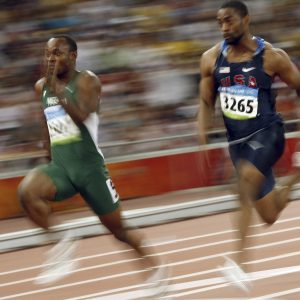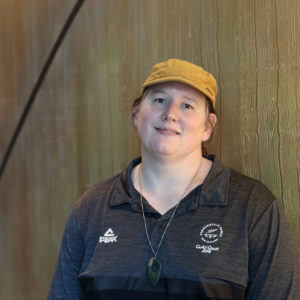Christine Mboma outruns the limits imposed on her
Despite a painful injury and being banned from certain sprint events, the Namibian athlete is staying positive and is determined to enjoy running and reach greater heights in her career.
Author:
25 May 2022

What was billed as a tantalising showdown between Jamaica’s sprint icon and nine-time world champion Shelly-Ann Fraser-Pryce and Namibian sensation Christine Mboma on 7 May turned into a devastating afternoon for the African teenager. As Fraser-Pryce powered across the finish line in a world-leading 10.67s at the Kip Keino Classic in Nairobi, Kenya, a distraught Mboma was writhing in pain on the track after pulling up halfway through the race.
The good news is that the 19-year-old shouldn’t be out of action for too long. The bad news is that her continued participation in sprint events rests in the hands of World Athletics – the international governing body that has already dictated she may not run distances from 400m up to 1 500m because of her naturally high testosterone levels. It’s the same ruling that has kept South Africa’s two-time Olympic champion Caster Semenya from competing in her specialist middle-distance events.
Mboma was hit particularly hard by the ruling last year. Having set several of the fastest times in the world over 400m in 2021, she was told that she was barred from that event at what would have been her first Olympic Games just a few weeks before the event started in Tokyo. “I got the news in the airport in Munich,” said her coach Henk Botha. “I’ll never forget that moment. I was furious.”
Once back at their training base in Italy, Botha sat down with Mboma and her training partner Beatrice Masilingi, who was also affected by the ruling, to plot a way forward. “I had some time to think on the plane how I was going to tell them about the news. I also had some time to calculate stuff and I said to them, listen girls, one thing is for sure, both of you will go to Tokyo. It won’t be for the 400m – your favourite item – but it will be for the 200m. And we’re not going to stand back in the 200m either. We’re going there to be competitive and be the best we can. I think both of them bought into my idea and the rest is history.”
Related article:
Looking back on that decision, Mboma said: “Of course, for any athlete to shift focus to a different event is challenging, but I just wanted to compete and so I took it in my stride and kept focused on training and racing the best I could.”
That best produced an Olympic silver medal with Mboma crossing the line in a world junior record of 21.82s behind gold medallist Elaine Thompson-Herah. “It felt amazing,” said Mboma. “I knew that I was in form and could potentially get on the podium if I ran my best, but of course there were such great athletes in that final, I knew anything could happen. When I crossed the line, I was so excited.
“It is such an honour to be the first Namibian woman ever to win an Olympic medal, and of course to be mentioned in the same sentence as Frank [Fredericks, Namibia’s four-time Olympic silver medallist] is incredible. He is such an icon. I want to continue to make Namibia proud.”
Inner strength
It was a remarkable rise for the woman who grew up in the tiny village of Shinyungwe, more than 800km northeast of Windhoek, and a result that unexpectedly catapulted her into the limelight. “It has come with a lot of exposure and attention, especially back home. But it has been amazing – people have been so supportive. I have never had this kind of attention before, so I know I need to just keep focused on training hard and competing my best, not getting caught up in the expectations of others.”
Speaking about her humble beginnings, Mboma said: “I didn’t have a father and my mother passed away when I was young, so life was not always easy. But I am close with my sisters and appreciate my family very much.”
Botha, who considers Mboma one of his own children, added: “Christine didn’t have it easy in life. Life was never on a gold platter for her. She had to fight for every single thing. She lost her mother fairly young. She then suddenly had to become a mother herself with her two siblings and she’s doing a great job.
Related article:
“She was forced to be a lot more mature than most of the young girls her age and I think that can sometimes be a lot of pressure on young people. But Christine is such a strong and strong-minded woman that it’s actually unbelievable how she’s coping with everything.”
Another thing to cope with was the added media attention since her switch to the 200m and her success at the Tokyo Games. But Mboma has a strong team around her. While her agents fend off any questions directed at her regarding the World Athletics ruling, her coach is happy to talk about it.
“Obviously, everyone has got an opinion. Currently the rule is as it is. Whether I agree with the rule or not, that is the rule. I think that World Athletics definitely need to change their attitude towards women in the sport and their attitude towards African athletes as well,” he said, suggesting the disparity in appearance fees for European and American athletes compared with African athletes is also something that needs to be addressed.
A binary world
Lwandile Simelane, first vice-president of the South African Sports Confederation and Olympic Committee, has a similar view when it comes to how African women athletes have been affected by the testosterone ruling. “I think we understand that sport is a binary environment. We’ve all grown up either playing in the girls’ team or the boys’ team. That’s simply how sport is and how sport has been,” she said.
“But we think there is an opportunity for us, as leaders in sport, to put our minds together to ensure that we create an environment that is more inclusive than exclusive, and I don’t think that the global community in sport has figured that out yet. I think we need to put medical specialists, activists and human rights thinkers in one room and just figure this thing out. We’re allowing ourselves to plod along on this thing and we’re ruining lives in the process.”
Many have suggested that the World Athletics ban is a racist one as African women are most affected by it. “I have very strong opinions on it, but I don’t think it’s racist in its nature or they intended it to be racist,” said Simelane. “I think it is very Euro-based. It doesn’t consider the physicality and the differences in physiological make-up of western, southern, northern, eastern types of environments.
I think you have to take cognisance that that is who you are actually affecting and then try to find out why.”
Related article:
Back on the track and away from the raging debates, Mboma is simply looking to recover from her recent injury and improve even more in the new events that have been forced on her. “After a successful assessment on Christine, the medical team told us that she’ll definitely be ready for the World Championships and the Commonwealth Games,” said Botha. “There’s actually a reason why the injury occurred and that is because of a growth plate in her left hip that they picked up wasn’t developed fully and that needs to be sorted out.
“The goal for the year is to become the woman that has run the most sub-22s in one year and also try to slowly put a stamp down on the 100m as well. As far as that is concerned, we were fairly well on track, but unfortunately the injury is there now and we need to attend to that. The good news is that the medical staff say if they fix the hip, she can be even faster. I am excited and happy that we can get back to training and she can just be the wonderful Christine that she is on the track, running and enjoying life.”
Mboma agreed. “I want to keep running as fast as I can, and to keep enjoying competing with the best in the world. Each race is an opportunity for me to test myself and to get better.”


